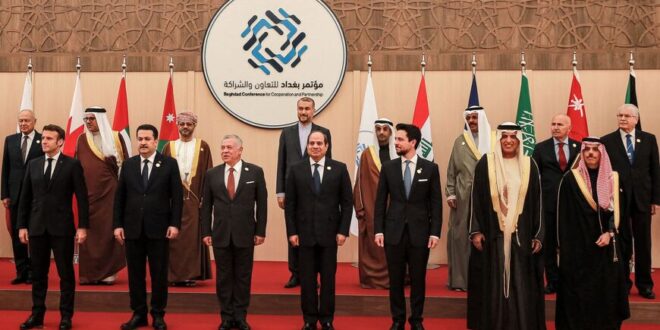The Iranian-Saudi dialogue stalled earlier this year amid the protests in Iran and political tensions in Iraq.
Iranian Foreign Minister Hossein Amir-Abdollahian met with his Saudi counterpart, Prince Faisal bin Farhan Al Saud, in Jordan Wednesday.
The two top diplomats are in the country for the Baghdad Conference for Cooperation and Partnership. The summit, which is being held for the second time, deals with stability in Iraq and also aims to address regional security issues. Amir-Abdollahian tweeted in Arabic that he met the foreign ministers of Jordan, Iraq, Qatar, Kuwait and Saudi Arabia at the event.
“The Saudi foreign minister affirmed to me his country’s readiness to continue dialogue with Iran,” he said.
Why it matters: Saudi Arabia cut off relations with Iran in 2016 after Iranian protesters attacked the Saudi Embassy in Tehran. The demonstrators were upset over Saudi Arabia executing Shiite cleric Nimr al-Nimr.
Saudi Arabia and Iran have long been at odds over numerous regional issues, perhaps most prominently Iran’s nuclear program. The two countries are also on opposite sides of the Yemen civil war, with Saudi Arabia backing the internationally recognized government and Iran supporting the Houthi rebels.
In 2021, officials from Saudi Arabia and Iran began holding direct talks — facilitated by Baghdad — in an effort to reduce tensions.
The Iran-Saudi dialogue continued in 2022. The following is a breakdown of important developments in the dialogue from the past year:
Iraq hosted the fifth round of Saudi-Iran talks in April. There have been no rounds since then.
In June, then-Iraqi Prime Minister Mustafa al-Kadhimi said the talks had made “remarkable progress.”
Iran delayed a sixth round of talks with Saudi Arabia in August due to the political instability in Iraq at the time.
Amwaj Media reported in November that Saudi Arabia stopped the dialogue with Iran. This was due to concerns over Iraqi Prime Minister Mohammed Shia al-Sudani, who replaced Kadhimi in October, according to Amwaj. Kadhimi had a pro-US outlook, whereas Sudani is an ally of Iran-backed political forces in Iraq. Sudani said he hoped to continue hosting the dialogue upon taking office.
In December, The Associated Press also reported that the dialogue had come to a halt. Citing Iraqi officials, the AP said that Iran felt that Saudi Arabia was instigating the widespread anti-government protests in Iran. Amir-Abdollahian’s tweet is therefore significant because it seemingly signals that the dialogue could be back on.
Analysts are divided on how much progress the talks between Iran and Saudi Arabia have made. A May report from the DC-based Soufan Center noted that the two specifically worked out issues regarding Iranians traveling to the kingdom for the Hajj pilgrimage.
Middle East Institute analyst Bilal Saab wrote in September that the progress in the Iran-Saudi talks has been “negligible” due to the two countries’ different goals. Saudi Arabia is seeking an end to direct and indirect Iranian attacks on its territory. Tehran wants better diplomatic relations with the Gulf due to Iran’s economic problems and to “drive a deeper wedge” between Saudi Arabia and the United States, according to Saab.
 Eurasia Press & News
Eurasia Press & News



